Growing up in Dallas, Texas, I watched as much television as any other kid. That is to say, I watched too much. There had to be better ways to spend my time and energy than parking myself in front of the tube. A truncated list of the ABC, NBC and CBS programs I saw in those days would include Ozzie and Harriet, The Honeymooners, Andy Griffith, Batman, Ed Sullivan, Bonanza, Dick Van Dyke, Get Smart, Gilligan’s Island, The Beverly Hillbillies, Dobie Gillis, Green Acres, Rawhide, Hogan’s Heroes, I Love Lucy, My Favorite Martian, The Monkees and Leave It to Beaver.
I saw the latter show many a time. It consisted of a White (none of the cast members were black or brown, if I remember correctly) family, the Cleavers, who lived in Mayfield, a suburb of New York City. Hugh Beaumont played Ward, the father. A congenial businessman who did little around the house, he smoked a pipe, balanced his checkbook and dispensed wisdom to his two sons. Barbara Billingsley played his wife June. (Although Ward and June seemed to have a fine relationship, they slept in separate beds.) A home-maker, she had lady-like pastimes and also was very concerned about the boys’ lives. The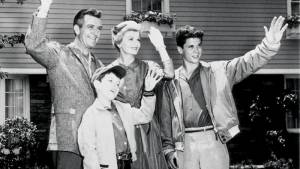 oldest was Wally, played by Tony Dow. Handsome and a bit vain about it, intelligent, polite and athletic, he got into less trouble than his friends Clarence “Lumpy” Rutherford (Frank Bank) and that smarty-pants Eddie Haskell (Ken Osmond). The title character was Theodore “Beaver” Cleaver, played by Jerry Mathers. Naïve and adventurous, he was involved in a wide array of hijinks (Beaver brings home a pet monkey, Beaver loses a library book, Beaver is infatuated with his teacher, Miss Landers, etc.), aided and abetted by Larry Mondello (Robert Stevens) and Gilbert Bates (Stephen Talbot), not to mention his brother.
oldest was Wally, played by Tony Dow. Handsome and a bit vain about it, intelligent, polite and athletic, he got into less trouble than his friends Clarence “Lumpy” Rutherford (Frank Bank) and that smarty-pants Eddie Haskell (Ken Osmond). The title character was Theodore “Beaver” Cleaver, played by Jerry Mathers. Naïve and adventurous, he was involved in a wide array of hijinks (Beaver brings home a pet monkey, Beaver loses a library book, Beaver is infatuated with his teacher, Miss Landers, etc.), aided and abetted by Larry Mondello (Robert Stevens) and Gilbert Bates (Stephen Talbot), not to mention his brother.
Every episode featured mirth (although seldom outright hilarity) and moral guidance as Ward and June sought to turn Wally and Beaver into upstanding young men. There is one I would like to reconstruct. Some of the details are lost to me, as will soon be clear.
The focus in this case was Wally. He (probably accompanied by Lumpy and Eddie) was at church—Sunday school, to be precise. Sunday school at the Presbyterian churches I attended in Dallas were coed, with the genders mixed. This one, however, was all boys; the girls presumably met somewhere nearby. Just the day before, Wally had received a $10 bill from his father as a birthday present. For a worthy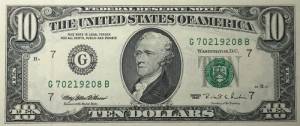 cause I honestly do not remember, the Sunday school teacher was collecting money from the boys. He—or possibly she—really urged all of them to give at least something. No matter how little, each one should donate. Wally, needless to say, had only that ten-spot, the one featuring Alexander Hamilton’s visage. He had been dreaming of how he would spend it until confronted with this moral crisis. Tony Dow played his role admirably here, struggling with what was “right” and his very human desires. Deeply if not profoundly reluctant, he nevertheless put it into the envelope provided by the Sunday school teacher and then into the plate. Seeing him do so was both funny and excruciating.
cause I honestly do not remember, the Sunday school teacher was collecting money from the boys. He—or possibly she—really urged all of them to give at least something. No matter how little, each one should donate. Wally, needless to say, had only that ten-spot, the one featuring Alexander Hamilton’s visage. He had been dreaming of how he would spend it until confronted with this moral crisis. Tony Dow played his role admirably here, struggling with what was “right” and his very human desires. Deeply if not profoundly reluctant, he nevertheless put it into the envelope provided by the Sunday school teacher and then into the plate. Seeing him do so was both funny and excruciating.
Fast forward a few days, and some of the church girls were talking among themselves. They, too, had been subjected to the same “let’s all donate at least a little” spiel. The results were meager. So they were raving about the generosity of the boys’ Sunday school class which had raised $10.34 (or a similar figure)! I really do not need to tell you how Wally felt about this matter or how Ward and June soon counseled him in their living room at home.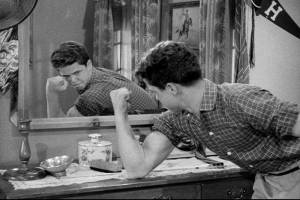
Leave It to Beaver’s run began in 1957 and ended in 1963 because Wally had graduated from high school and Beaver was no longer the cute boy of his earlier years. Kids do grow up. Still, cultural commentators seem to give it high marks as representing the ideal American mid-20th century family.
I will conclude with a tale about the actor in the main female part, Barbara Billingsley. She was seen and maybe even mocked, for being a bit too perfect—wearing high heels, a pearl necklace and earrings at home, and never a hair out of place. She spoofed that image in the 1980 satirical comedy film Airplane. Let me set the scene. The packed airplane in which she was traveling was experiencing turbulence at 30,000 feet. Making matters worse, the man in the cockpit was a traumatized Vietnam War vet with a fear of flying. He was there because the pilot had been incapacitated by food poisoning. Among the passengers were two black guys, played by Al White and Norman Gibbs, from deep in the “hood.” One was both sick and upset about a domestic situation with his wife. The White airline stewardess tried to help but could not decipher their over-the-top patois. White and Gibbs later admitted they had concocted the majority of it for comedic effect.
Pretty but clueless stew: “Can I get you something?”
Jive Man No. 1: “S’mo fo butter layin’ to the bone. Jackin’ me up. Tightly!”
Pretty but clueless stew: “I’m sorry, I don’t understand.”
Jive Man No. 2: “Cutty say he cain’t hang.”
(At this point, Billingsley, sitting on the other side of the aisle and one seat back, kindly offered to help since she was fluent in “jive.” As you surely know, jive is not a language but the jargon of hipsters—especially black hipsters.)
Billingsley: “Oh, stewardess, I speak jive.”
Pretty but clueless stew: “Oh, good.”
Billingsley: “He said that he’s in great pain and he wants to know if you can help him.”
Pretty but clueless stew: “Would you tell him to just relax and I’ll be back as soon as I can with some medicine?”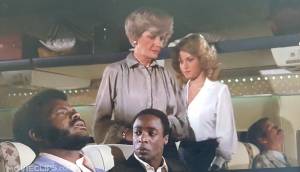
Billingsley: “Jus’ hang loose, blood. She gonna catch up on de rebound a de medcide.”
Jive Man No. 1: “What it is, big mamma? My mamma din’ raise no dummy. I dug her rap.”
(Billingsley and the two black guys then engaged in a brief and contentious argument in which she seemed to prevail.)
Billingsley: “Cut me some slack, Jack! Chump don’ wan no help, chump don’ git no help. Jive-ass dude don’ got no brains anyhow.”
Her tone of voice, facial expression and body language were not those of a late-middle-age European-American woman, as she went striding down the aisle. The funniest thing of all was how White and Gibbs looked at each other with shock, puzzlement and maybe even a measure of respect for their fellow passenger.

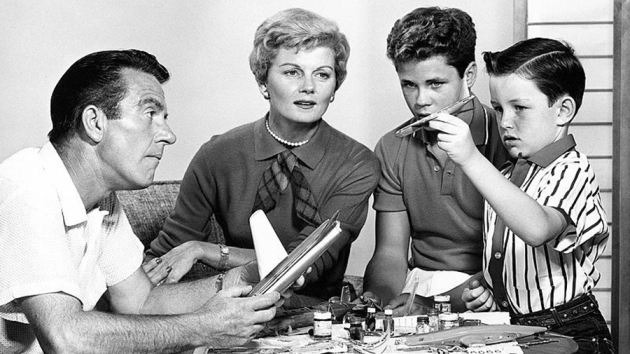
Add Comment